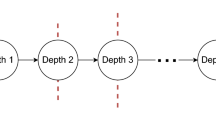Abstract
Traditional game theory is based on the assumption that the opponent is a perfect reasoner and all payoff information is available. Based on this assumption, game theory recommends to estimate the quality of each possible strategy by its worst possible consequences. In real-life, opponents are often not perfect and payoff information is often not exact. If the only disadvantage of some action is that an unusually clever opponent can find a complicated way to counter it, then this action may be a perfect recommendation for a play against a normal (not unusually clever) opponent.
In other words, to estimate the quality of each move, instead of a normal minimum of possible consequences, we must consider the robust minimum that takes into consideration the fact that some of the consequences will never occur to the normal opponent.
We show that in a reasonable statistical setting, this idea leads to the class of OWA operators.
It turns out that playing against an imperfect opponent is not only a more realistic strategy, it is also often a simpler one: e.g., for the simplest game for which playing against a perfect opponent is computationally intractable (NP-hard), playing against an imperfect opponent is computationally feasible.
Similar content being viewed by others
Explore related subjects
Discover the latest articles, news and stories from top researchers in related subjects.Author information
Authors and Affiliations
Rights and permissions
About this article
Cite this article
Yager, R., Kreinovich, V. Using robust optimization to play against an imperfect opponent. Soft Computing 1, 69–80 (1997). https://doi.org/10.1007/s005000050008
Issue Date:
DOI: https://doi.org/10.1007/s005000050008




